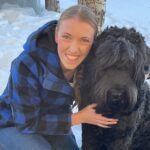The Hollinshead Laboratory is committed to advancing the field of artificial reproductive technologies, contraception, in vitro production of hormones to manipulate the reproductive cycle, and novel therapeutics. At the heart of our research is the belief that a comprehensive understanding of basic reproductive processes transcends species boundaries and holds the key to transformative advancements in veterinary medicine and beyond.
Our lab is founded on several key philosophies and goals that drive our research and guide our interactions within and beyond the scientific community which include:
- A comparative reproduction research program in which we work with a diverse array of species including canine, feline, equine, bovine, and wildlife species
- We are dedicated to bridging the gap between bench-top discoveries and clinical applications to improve veterinary and reproductive operations, foster advancements in reproductive success, and benefit animal health and well-being.
- We are committed to improving the well-being of animals and contributing positively to the sustainability of our environment. Our research explores ways to enhance animal health and reproduction, with a broader impact on conservation efforts and environmental stewardship.
- We are dedicated to the development and optimization of effective and novel in vitro models to serve as invaluable tools for studying reproductive diseases and testing the efficacy of potential biological therapeutics. Importantly, this allows reduced reliance on live animals in research, offering ethical alternatives that advance scientific understanding.
- Collaboration is the cornerstone of scientific progress and key to the success of our research program. By working collaboratively, we leverage diverse expertise and resources to address complex questions and challenges in reproductive physiology.
- A core goal of our lab is to equip undergraduate, graduate, and post-doctoral fellows with the latest scientific techniques and methodologies, as well as clinical skills and knowledge necessary to tackle new research questions and challenges in an inclusive, supportive, collaborative, and enjoyable research environment that promotes creativity, innovation, and the exchange of ideas.
People
Lab Principal Investigator (PI)
Associate Professor
College of Veterinary Medicine and Biomedical Sciences
Senior Research Technician
College of Veterinary Medicine and Biomedical Sciences
Animal Reproduction and Biotechnology Laboratory
Postdoctoral Fellow
College of Veterinary Medicine and Biomedical Sciences
Animal Reproduction and Biotechnology Laboratory
Funding: NIH K01
Clinical Resident in Theriogenology
College of Veterinary Medicine and Biomedical Sciences
Companion Animal Theriogenology Residency Training Program
Funding: AKC-CHF-TF



news and updates view all
contact information
Animal Reproduction and Biotechnology Laboratory
3105 Rampart Rd, Fort Collins, CO 80521
(931) 303-1338
[email protected]


